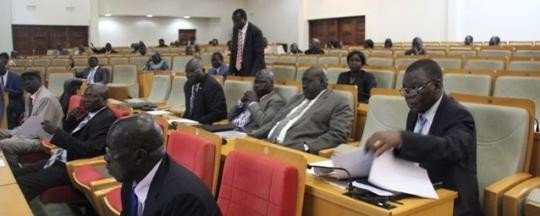South Sudan Council of States approves amendments to create 28 States

The South Sudan Council of States headed by Joseph Bul Chan on Tuesday ratified the constitutional amendments on the establishment of 28 states instead of the current ten.
The bill had been presented to the members of the council's lower house in a vote in November that failed to reach the required 2/3 majority for passing constitutional amendment. A constitutional amendment must be passed by both houses of parliament in separate sitting.
The creation of 28 states was first ordered by President Salva Kiir in October before going to parliament.
Speaking to media in Juba, the council's information chairman Lewis Vito Akuar said the council endorsed the establishment order which creates more 18 states in addition to the present 10 states.
Akuar, who is also the Western Bahr el Ghazal representative to the council, noted that names and capital of some states will be changed within a week's time.
He said the next step is for Kiir to sign the decision into law, adding that any decision issued by the President Kiir does not necessarily need to be discussed much to be passed.
The move to create 28 states has stirred controversy and condemnation from the armed opposition, sections of civil society, and the international community as being a violation of the signed peace agreement.
No money to map MP allowances
Separately, national legislative assembly speaker Manasse Magok Rondeal told members of parliament that the government does not have sufficient funds to pay off their arrears, and that the assembly has already informed the President of the Republic about those unpaid arrears.
Members of the assembly asked Manasse to pay cost of living allowances and dues for meetings. They said members are owed 37,000 SSP each which have not been disbursed since 2014.
Members of the assembly accused some of their colleagues of lending out money for their own purposes and benefits. They further claimed that their economic conditions have affected payment of special meetings, transportation, housing, and cost of living bonuses.